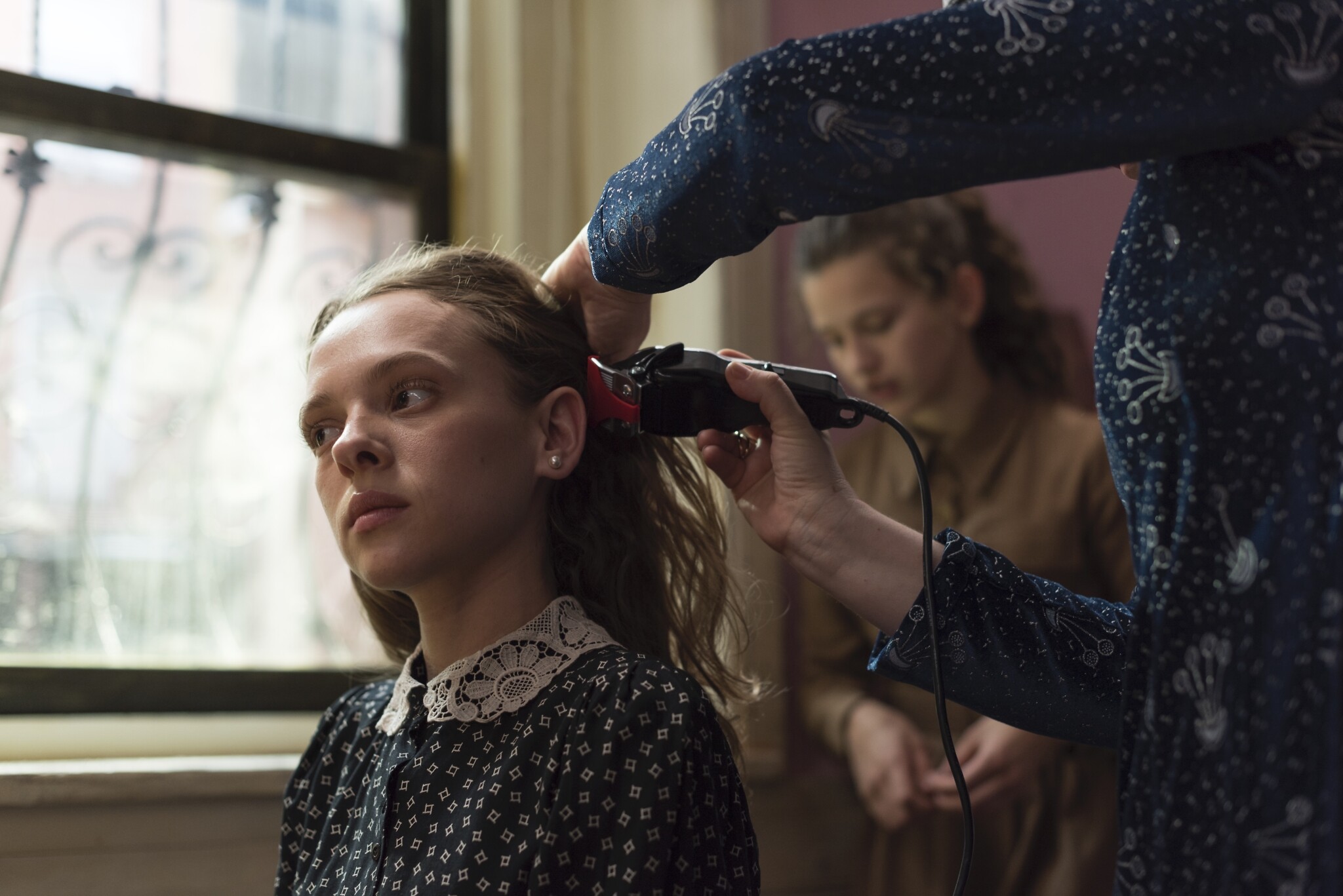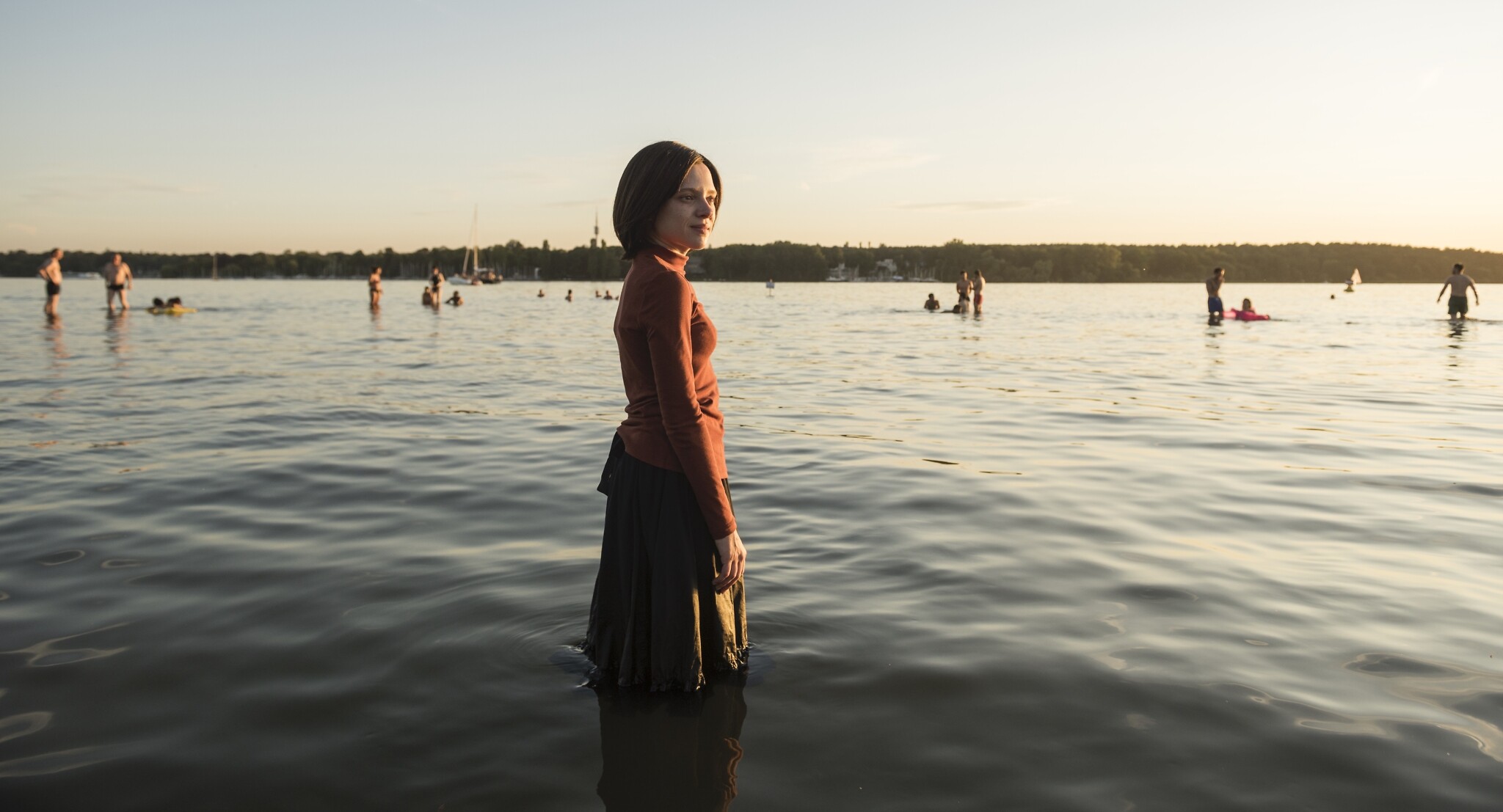Airing March 26, the unprecedented German-produced, based-on-true-life, mini-series in Yiddish is powered by Israeli actress Shira Haas and an explosive female creative team
On the first day of shooting for the new limited Netflix series “Unorthodox,” actress Shira Haas had her head shaved on camera. Her thick, long, light brown locks fell to the ground as she cried and smiled simultaneously.
“I was ready for it, and it was important for the story. But still, I was personally filled with the same mixed emotions Esty had,” Haas said of the character she plays in this groundbreaking production.
The four-episode series, inspired by the 2012 memoir, “Unorthodox: The Scandalous Rejection of My Hasidic Roots,” by Deborah Feldman about leaving her ultra-Orthodox upbringing, begins streaming worldwide on March 26. It is the first Yiddish-language production ever to come out of Germany
By shaving her hair off and donning a wig, 18-year-old Esty assumes in good faith her prescribed role as a newly married woman in the insular Satmar community in Williamsburg, Brooklyn. She strives unsuccessfully to make her husband and extended family happy by getting pregnant. One miserable year later, she boldly runs away to Berlin, removes her wig, and starts to find her own voice — both figuratively and literally.

Shira Haas in Netflix’s ‘Unorthodox.’ (Anika Molnar/Netflix)
Although set in the Satmar community with its myriad religious laws, customs, and particular way of life, “Unorthodox” is essentially a universal coming of age story. Produced and written by Anna Winger and Alexa Karolinski, expertly directed by Maria Schrader, and performed by an excellent cast, the show will likely appeal to viewers of all backgrounds.
Kindly Support Our Blog by Browsing the Ads
Thanks so much, it means a lot!
International audiences have recently enjoyed peeks into Hasidic life through unexpectedly popular films and television series such as “Menashe” and “Shtisel.” Schrader, however, signed on to “Unorthodox” because it came at the subject from a unique angle.
“I was drawn to the project because it presents an unheard voice. The female perspective on growing up in this community has so far been rather untold,” said Schrader, who is also an acclaimed German actress.
Winger, an American Jew living in Berlin, and Karolinski were eager to turn Feldman’s personal journey into a television series, but they were intent on including specific themes they wanted to explore — mainly those related to Jewish life in post-World War II Germany.
Feldman left her husband and the Satmar community and stayed in the New York area for some years, studying literature at Sarah Lawrence College. It was only later that she moved with her young son to Berlin. In contrast, the fictional Esty heads to Berlin immediately, thus sharply juxtaposing life in the contemporary cosmopolitan German capital with the Holocaust trauma driving the Satmar Hasidic outlook on life.
“With Deborah’s blessing, we made a lot of changes,” said the 36-year-old Karolinski, who grew up in Berlin as the granddaughter of Holocaust survivors and now lives in Los Angeles.
“We brought Esty to Berlin to be able to talk about what it would be like for a Satmar Jew to flee to the country of the Holocaust’s origin, and to reflect on how Berlin is built on trauma and how history creeps through everything there,” she said.
The series’ production team used shooting locations to symbolically convey these ideas. For instance, Esty deliberately takes off her wig in Wannsee Lake in view of the villa where plans for the Final Solution were determined in 1942. At the end of the final episode, she walks under the Brandenburg Gate, in the opposite direction through which Hitler processioned after seizing power in 1933.
“It’s about taking back things — giving things new meaning, while acknowledging past meaning,” Karolinski said.
It was an extremely challenging task to cast the Yiddish production, which was shot in Berlin and New York.
“We needed many actors who could act in Yiddish as their mother tongue — or as if it was — and who were good at their craft. We ended up with a real international group from New York, Paris, Bucharest and Israel,” Schrader said.
The three young main actors all have ties to Israel. Haas, 24, and Amit Rahav, who plays Esty’s husband Yanky, are Israelis from Tel Aviv. Jeff Wilbusch (born Yisroel Iftach Wilbuschewitz) was raised in a Hasidic community in Jerusalem before leaving it as a teenager and moving to Europe to study economics and later act.
“I got chills when I saw Shira’s audition tape, which was of the scene where she first meets her husband-to-be Yanky,” Schrader, 54, said of Haas, whose standout, radiant performance anchors the series.
“I didn’t know Yiddish at all, but I made sure that I learned the lines perfectly for the audition,” Haas said.
“After I got the part, I would listen to my lines over and over through my ear pods. People around me probably thought I was listening to music, but I was listening to Yiddish,” she said.
The Yiddish dialogue was a challenge for all involved, even for some of the older Yiddish-speaking actors. Yiddish consultant Eli Rosen was brought in to coach the actors to convincingly recite their lines in the specific American Hasidic Yiddish dialect of the Satmar Hasidim.
“Eli was our ‘rabbi.’ He was the special sauce to this project. He made sure everything was portrayed accurately and authentically — the Yiddish, the clothes, the rituals, the lifestyle and the culture,” Karolinski said.
Haas recalled intensively preparing for her role with Rosen. “We went over everything letter by letter, word by word. I wanted to know exactly what I was saying and to make sure it came out of me automatically in front of the camera. I wanted to give the language the respect it deserved,” she said.
According to Karolinski, there have been many productions about Jews made in Germany. However, “Unorthodox” is the first created in the country by Jews, and in particular German Jews.
“We wanted to make this from the inside out. All the actors are Jewish, and some of the extras are played by ex-Hasids,” she said.

From left: Jeff Wilbusch (Moishe) and Amit Rahav (Yanky) in Netflix’s ‘Unorthodox’ (Anika Molnar/Netflix)
Although Haas had experience portraying a young ultra-Orthodox woman in the international hit “Shtisel,” it didn’t mean that she automatically knew how to approach playing Esty.
“Esty and Ruchami [Haas’s ‘Shtisel’ character] are so different. Every community is so different from one another. And people are different from one another within a given community. I love both characters so much, but I ended up approaching Esty quite differently,” Haas said.
Schrader said she felt a great responsibility in portraying the Satmar community on screen. Karolinski agreed, saying that the series was not meant to condemn the Hasidic way of life, which obviously works for many adherents.
“We avoided any easy opportunity to judge a specific way of life, even though it may be foreign or unsettling for many. My duty as a director is to paint complex characters and a complex picture,” she said.

Shira Haas in Netflix’s ‘Unorthodox’ (Anika Molnar/Netflix)
Indeed, none of the characters in “Unorthodox” are portrayed in a black and white manner. Esty is torn between the harsh challenges of self-actualization and the emotional comforts of the only life she has ever known. Yanky turns out not to be the spiteful husband who comes after his wife to drag her home, but rather the heartbreaking victim of his own circumstances. Wilbusch’s character Moishe (Yanky’s cousin and the rabbi’s henchman) is fatally caught between his attraction to the seedier sides of the secular world and his allegiances to family and religious life.
That being said, “Unorthodox” undeniably applauds the strength it takes to be different and follow one’s own path in life.
“Every person in every society has the need to belong and feel safe and have a home, while at the same time fulfilling their individual needs and desires,” Schrader said.
1 comment:
"He was the special 'sauce' to this project". Besides yiddish you need to learn English!
Post a Comment